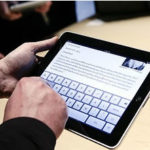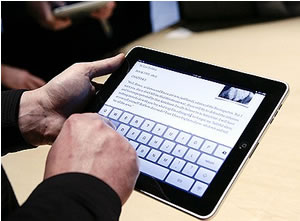
Educators say there’s a simple reason they believe the Apple iPad pilot programs coming to colleges and universities this fall will run smoother than previous trials with popular eReaders: the apps.
Sprawling research university campuses and rural community colleges alike will test the iPad in small groups when students return to school in August and September, evaluating how learning can be improved using a device that has proven popular among 20-somethings who were avid about Apple products even before the iPad was released in April.
University IT departments launched pilot programs for eReaders like the Amazon Kindle and Kindle DX in 2008 and 2009, but student and faculty surveys showed that traditional textbooks were preferred over the eReader devices.
Many Kindle pilots, like one at Arizona State University, were stopped after blind and low-sighted students said the eReader’s small menu and navigation tools were inaccessible. In contrast, an official for the National Federation of the Blind said this week that the iPad’s large screen has gained favor in the blind and low-sighted communities.
“The iPad is considerably closer to an eReading solution that will be effective for blind students than other products that are out there,” said Chris Danielson, a spokesman for the NFB. “I don’t know whether it’s perfect or not, but Apple has clearly thought about accessibility and made and effort to improve it.”
Education technology officials said the iPad also could be more widely accepted because of its vast library of educational applications, such as “The Elements: A Visual Exploration,” which guides students through every part of the periodic table with graphics of each element, presenting an old lesson plan in a captivating platform.
WolframAlpha, an online search engine that caters to researchers, released an iPad app that connects directly to the WolframAlpha supercomputing cloud, a potential boon for campus research teams who could continue their work with a device that is more portable than even a laptop, experts said.
Nick Smerker, an instructional technologist at Washington College in Chestertown, Md., said he lobbied campus decision makers for an iPad pilot program “as soon as it was announced” that the long-awaited gadget would hit stores in the first week of April.
Washington College bought two iPads in April, Smerker said. The college now has four of the Apple eReaders, and Smerker said the 1,400-student campus could have 14 iPads by the start of the fall semester, depending on budget allocations.
“It’s much more than just an eReader that people have seen and used before,” he said. “[Apps] are what will propel the iPad past other [devices].”
Smerker said the iPad has a built-in advantage over other eReaders: familiarity.
“The thing that will make it easy to sell the iPad to students is if you’ve ever used an iPod, you already understand how [the iPad] works,” he said, referring to Apple’s music player that has similar features and controls as the iPad. “It’s not hard to see Apple products are appealing and sexy to students.”
A survey conducted by financial services firm Morgan Stanley in April showed that the iPad was most popular among consumers ages 25-34. Nearly three in 10 respondents from that age group said they were “interested” in buying an iPad, and 20 percent of respondents who own an iPhone, iPod, or Mac computer were “extremely interested” in buying Apple’s latest release, compared with 4.6 percent of respondents overall.
Oklahoma State University (OSU) will oversea one of this fall’s biggest iPad pilots when it gives the device to 125 students in five courses within the School of Media and Strategic Communications and the Spears School of Business at the university’s Tulsa and Stillwater campuses.
OSU officials said they would track cost savings in the iPad test run. Students enrolled in one course in the pilot program will save about $100 on the course textbook, which can be downloaded and read on the iPad.
“This pilot … will provide valuable insight into the research benefits of the Apple iPad in the classroom,” said OSU President Burns Hargis. “The iPad has had an amazing impact since it was introduced last April, and we are excited to be able to put this powerful and creative tool in the hands of students and faculty and see what happens.”
Bill Handy, visiting assistant professor in OSU’s communications program and a leader of the iPad initiative, said educators would focus on how students and professors use the iPad apps to problem solve in the classroom, and “how the integration of these mobile tools can expand the tactical abilities of students as they enter the workforce.”
At Houston Community College (HCC), where campus officials piloted the Kindle in several classrooms, the iPad is being used by 25 students in an anatomy and physiology course this summer.
HCC students pay about $200 per textbook, the college said in a June 18 announcement, so accessing course material on the iPad will save some students almost $1,000 per semester.
Paul Garcia, a life sciences professor at HCC whose students are piloting the iPad, said the gadget’s video capabilities and crisp visuals could give the Apple product the edge over other eReaders tested at colleges and universities.
“Our students are already so visual as far as learning styles that it’s becoming the new wave,” Garcia said. “We, as instructors, are going to have to adjust our teaching methodology in order to keep them engaged, and in using the iPad, we can show the students movies and animations and give them a wide array of multimedia resources that they can tap into.”
- Research: Social media has negative impact on academic performance - April 2, 2020
- Number 1: Social media has negative impact on academic performance - December 31, 2014
- 6 reasons campus networks must change - September 30, 2014

Comments are closed.